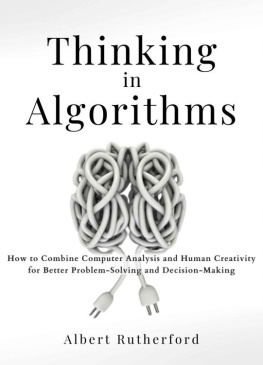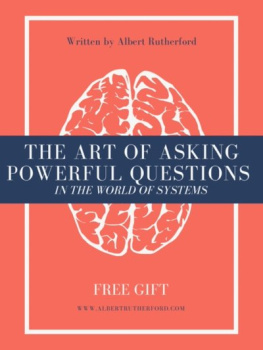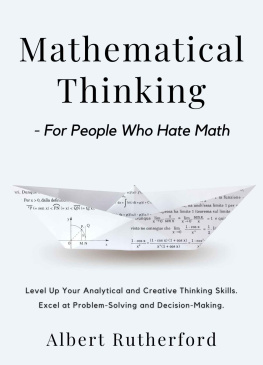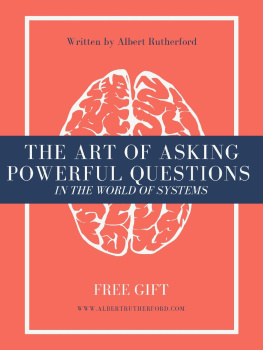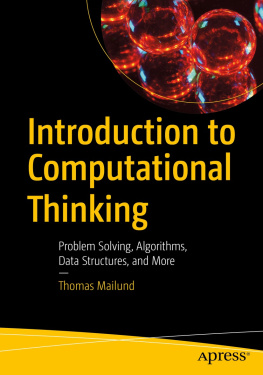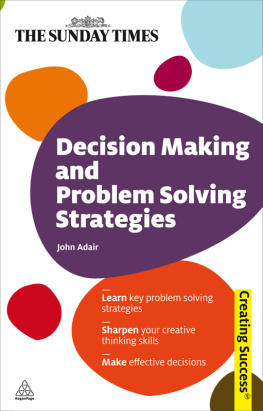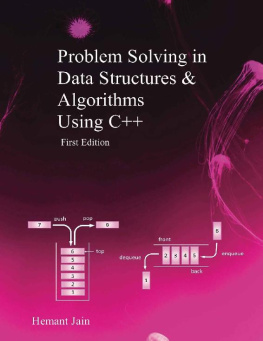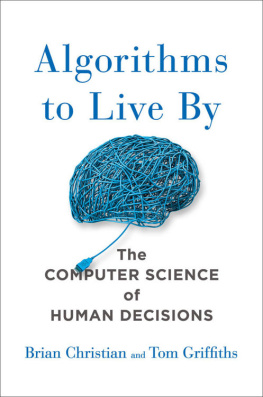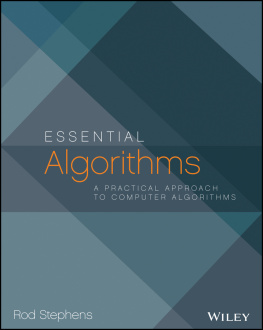Thinking in Algorithms
How to Combine Computer Analysis and Human Creativity
for Better Problem-Solving and Decision-Making
By Albert Rutherford
Copyright 2021 by Albert Rutherford. All rights reserved.
No part of this publication may be reproduced, stored in a retrieval system, or transmitted in any form or by any means, electronic, mechanical, photocopying, recording, scanning or otherwise, except as permitted under Section 107 or 108 of the 1976 United States Copyright Act, without the prior written permission of the author.
Limit of Liability/ Disclaimer of Warranty: The author makes no representations or warranties with respect to the accuracy or completeness of the contents of this work and specifically disclaims all warranties, including without limitation warranties of fitness for a particular purpose. No warranty may be created or extended by sales or promotional materials. The advice and recipes contained herein may not be suitable for everyone. This work is sold with the understanding that the author is not engaged in rendering medical, legal or other professional advice or services. If professional assistance is required, the services of a competent professional person should be sought. The author shall not be liable for damages arising herefrom. The fact that an individual, organization of website is referred to in this work as a citation and/or potential source of further information does not mean that the author endorses the information the individual, organization to website may provide or recommendations they/it may make. Further, readers should be aware that Internet websites listed in this work might have changed or disappeared between when this work was written and when it is read.
For general information on the products and services or to obtain technical support, please contact the author.

Click here for your FREE GIFT: The Art of Asking Powerful Questions in the World of Systems
Table of Contents
Chapter 1: Homo Irrationalis
Humans are strange creatures. We often do things that dont make sense, sometimes even to ourselves. What makes us more willing to purchase a product for $4.99 than for $5.00? Why do we get items for 50% off that we would never buy at full price? And what makes us so eager to use products celebrities use when we have nothing in common?
Many of our decisions in life are seemingly random or based on whims. But even our most illogical actions are formulaic. As Dan Ariely says in his book Predictably Irrational, these irrational behaviors of ours are neither random nor senseless. They are systematic, and since we repeat them again and again, predictable.
Ariely is a psychology and behavioral economics professor at Duke University, a field of study that focuses on answering questions just like those weve posed. Researchers like Ariely have discovered the patterns behind our senseless habits by studying the effects of psychological, social, cognitive, and emotional factors on our economic decisions (Morgan, 2019). Behavioral economics not only teaches us about how our emotions, feelings, and biases affect our shopping but our entire lives.
The Truth About Our Gut feeling
We often talk about our gut feeling as this visceral, spur-of-the-moment urge to go in a certain direction or make a particular choicean impulse towards doing what we feel is right. Similarly, we might tell someone to listen to their heart as a way of following their passions and desires, using their emotions to do whats best. Yet, we also tell people just as often to use their head.
We think of using logic and using emotion to make decisions as separate ideas when they go hand-in-hand. As behavioral economics and psychology have discovered, its next to impossible to decide without using our feelings and biases. Our heads often defer to our hearts to help make quick choices.
Modern research and technology have looked into the brain and found it comprises a messy network of overlapping emotional and rational sections. Whether we like it or not, our rationality has been tainted by our feelings where the two are impossible to extricate. When comparing properties, making pros and cons lists may be the logical way of looking at things, but a feeling of home will usurp them every time. We may crunch the numbers to see if we can afford those new shoes weve been eyeing, but if we believe theyll bring us enough happiness, our minds will be made up no matter what our calculations say.
Even when we think were making a logical choice, emotional impulses will seize control of situations and steer us in illogical directions. Our gut often hot-wires our decisions and takes them on a joyride to buy things for a rush of dopamine despite our empty wallets or to go on a date with an attractive person we know isnt good for us.
When we leap to conclusions and grab for the nearest solution or craving, were not cutting out our brains completely. Theres no way to be that carefree. Instead, our minds recognize that they must find a quick solution and speed up the process of decision-making to the degree that we might not even be able to follow. This isnt some miraculous hyper-speed thinking function but a simple process of shortcuts.
Weve developed these shortcuts, known as heuristics, as a survival mechanism that enables us to act more efficiently during a life-or-death situation. But, as weve evolved, it has become a less beneficial part of our everyday lives. Now we use quick thinking to make decisions about things that have no dire consequences or any consequences at all, like choosing whether we should get lettuce or spinach at the grocery store or picking out the next book we want to read from our shelf. Although heuristics speed up our thinking processes and work fine for inconsequential choices, they do so by creating corner-cutting habits that can be too simplistic for our own good.
Our Brains in Efficiency Mode
The more our society has grown and flourished, the more we have available to usmore entertainment, relationships, connectivity, knowledge...and more options. In fact, we have too many options. From the time we get up to the moment we fall asleep, we ask ourselves to decide on almost every minute of the day (sometimes more). But, for the most part, we dont notice these choices taking place. Our brains have gotten used to finding ways to function efficiently without interfering with the flow of our day. Like a server running in the background of a computer setup, our brains store, sort, process, and draw on information from previous experiences. This Rolodex of information allows our minds to be ready with conclusions to our questions before or quickly after they arise. This way, our days flow isnt disturbed.
Our brains are like great warehouses of information. And when the boss (us) asks for a file, its just too much work to run to the other end. Instead, the poor employee grabs for a nearer drawer. It might not have the exact or most correct answer the boss was looking for, but its satisfactory enough that the job is considered finished. Maybe its a B+ or a C+ type of answer, but its good enough, and the employee is let off the hook.
Our brains dont just do this to make us happy; they do it to save energy. We only have so much brain power to give to decision making every day, so we have to make sure that we save it for the important stuff. Theres no need to waste our fuel deciding what shoe goes on which foot or how to drive a car when we can put those actions on autopilot. If we gave our all to everything we had to choose in life, it would be like taking every possible road on how to work; wed run out of gas long before we reached our destination.
Next page
